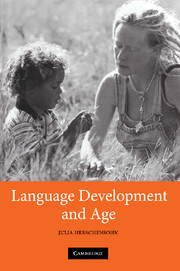
-
Select format
-
- Publisher:
- Cambridge University Press
- Publication date:
- 22 September 2009
- 18 October 2007
- ISBN:
- 9780511486487
- 9780521872973
- 9781107404885
- Dimensions:
- (228 x 152 mm)
- Weight & Pages:
- 0.602kg, 304 Pages
- Dimensions:
- (229 x 152 mm)
- Weight & Pages:
- 0.41kg, 304 Pages
You may already have access via personal or institutional login
Book description
The anecdotal view of language acquisition is that children learn language with apparent ease, no instruction and in very little time, while adults find learning a new language to be cognitively challenging, labour intensive and time-consuming. In this book Herschensohn examines whether early childhood is a critical period for language acquisition after which individuals cannot learn a language as native speakers. She argues that a first language is largely susceptible to age constraints, showing major deficits past the age of twelve. Second-language acquisition also shows age effects, but with a range of individual differences. The competence of expert adult learners, the unequal achievements of child learners of second languages, and the lack of consistent evidence for a maturational cut-off, all cast doubt on a critical period for second-language acquisition.
Reviews
'… will most certainly function as a rich resource for scholars interested in age effects in language acquisition for many years to come.'
Source: Journal of Linguistics
Contents
Metrics
Full text views
Full text views help Loading metrics...
Loading metrics...
* Views captured on Cambridge Core between #date#. This data will be updated every 24 hours.
Usage data cannot currently be displayed.
Accessibility standard: Unknown
Why this information is here
This section outlines the accessibility features of this content - including support for screen readers, full keyboard navigation and high-contrast display options. This may not be relevant for you.
Accessibility Information
Accessibility compliance for the PDF of this book is currently unknown and may be updated in the future.


